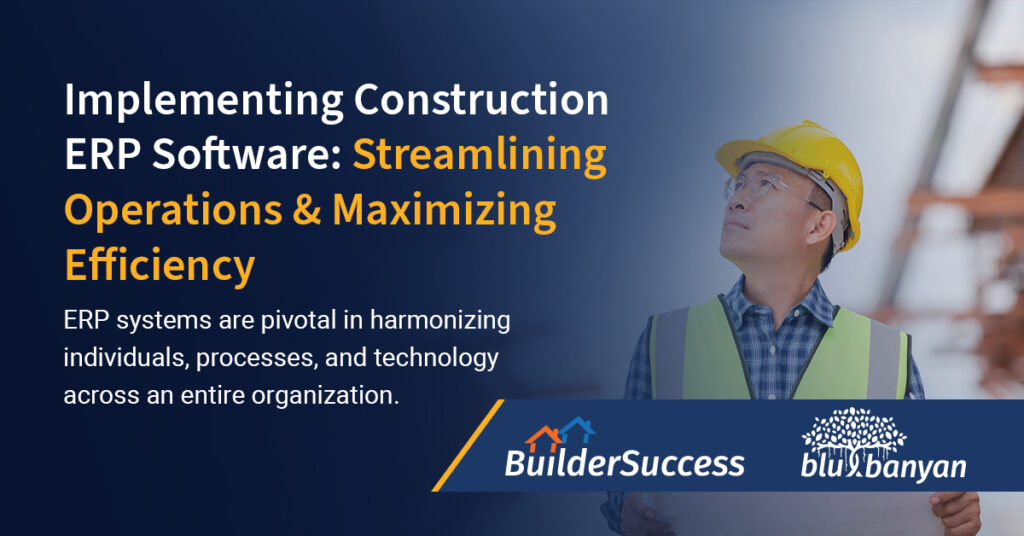As environmental concerns increase and construction costs soar worldwide, construction management solutions are rapidly becoming popular for organizations seeking sustainable and cost-effective project management. With the construction sector expanding, it becomes increasingly crucial for construction companies to optimize their operations and manage their resources effectively. In this context, implementing a construction-specific Enterprise Resource Planning (ERP) software solution can be pivotal.
Understanding ERP Software
An ERP system is a comprehensive application that automates business processes and offers insights and internal controls to facilitate day-to-day operations. It operates on a central database, acting as a single source of truth, gathering inputs from various departments—including accounting, project management, inventory management, field services management, sales/CRM—all integrated into a unified platform.
The Power of a Construction-Specific ERP
When considering ERP software options, it is essential to distinguish between a construction-specific ERP solution and an industry-agnostic one. While industry-agnostic ERP systems can be tailored to different sectors, construction-specific ERP software is explicitly designed to meet the unique needs of construction companies. It incorporates industry-specific modules, such as construction project management, equipment tracking, and project cost monitoring, providing specialized features and functionalities to streamline construction-specific workflows.
Once the distinction between construction-specific and industry-agnostic ERP solutions is clear, the implementation process for construction ERP software can begin. To ensure a smooth transition and long-term success, some key considerations and steps must be carefully addressed.
Establishing Clear Goals and Objectives
Before implementing any software solution, defining clear and specific goals and objectives is paramount. These may include enhancing project management efficiency, optimizing resource allocation, improving cash flow management and cost control, and strengthening compliance with regulatory standards. Clearly outlining these objectives guides the selection process and sets realistic expectations for the implementation.
Selecting the Appropriate Software
Choosing the right construction ERP software depends on the specific goals and objectives identified earlier. Thorough research and evaluation of different vendors are necessary, considering factors such as functionality, scalability, ease of use, integration capabilities, and vendor reputation. The selected software should align with the defined goals and objectives and accommodate future growth and industry requirements.
Engaging Key Stakeholders
A successful implementation necessitates the involvement of key stakeholders from across the organization. Representatives from various departments should be engaged, including project management, finance, operations, and IT. Gathering their input, understanding their unique needs, and addressing any concerns fosters collaboration and ensures the ERP software meets the diverse requirements of the organization.
Securing Company-Wide Support
Gaining company-wide support is closely linked to involving key stakeholders. Effective communication about the benefits of the construction ERP software and its alignment with the organization’s overall strategy is crucial. Emphasizing the software’s positive impact on productivity, efficiency, and profitability increases the likelihood of the organization embracing the change.
Developing a Comprehensive Implementation Plan
A well-defined implementation plan forms the backbone of a successful ERP software deployment. This plan must include a detailed roadmap outlining key milestones, timelines, resource allocation, and dependencies. The implementation process can be divided into phases to manage risks effectively and ensure a controlled transition. Assigning responsibilities and establishing clear communication channels promote collaboration and facilitate progress tracking.
Providing Adequate Training
Managing any significant change can be challenging, which is why comprehensive training is essential to ensure a smooth transition. Thorough training sessions should cover all relevant modules and functionalities of the construction ERP software. Both initial and ongoing training should be offered to support continuous learning and skill development among employees. Providing resources such as user manuals, video tutorials, and online support reinforces training efforts and encourages self-guided learning.
Testing and Validating the System
Thorough testing and validation of the construction ERP software are essential to ensure its smooth functioning before going live. Extensive testing across various scenarios and workflows helps identify and rectify potential issues or bugs. Involving key stakeholders, who will be end-users, in the testing process gathers valuable feedback and ensures the software meets their specific needs. Validation against the defined goals and objectives ensures that the ERP software delivers the expected outcomes.
Monitoring and Measuring Performance
Following the successful implementation of the construction ERP software, continuous monitoring and measurement of its performance are critical. Key performance indicators (KPIs) should be established to assess the software’s impact on project timelines, resource utilization, cost control, and overall operational efficiency. Regular review and analysis of the data identify areas for improvement and prompt proactive measures to address any issues or bottlenecks.
Ensuring Ongoing Maintenance and Support
To achieve long-term success, regular maintenance and support are essential once the software is up and running. An in-house support team can be set up, or the software vendor can be engaged for ongoing technical assistance, software updates, and bug fixes. Regularly reviewing and optimizing the software configuration helps accommodate evolving business requirements and industry trends.
Blu Banyan: Your Partner in Construction ERP
Implementing construction ERP software successfully becomes a seamless process by following these steps and considerations. With the right software solution in place, your organization can streamline operations, maximize efficiency, and capitalize on the growing opportunities in the construction industry.
Looking to harness the potential of construction ERP software? At Blu Banyan, we specialize in helping organizations implement construction ERP software to increase the productivity and efficiency of their business.



